#Global Innovation Index
Text
India's Growing Global Stature in Ascent: Pradhan
India's Growing Global Stature in Ascent: Pradhan
@neosciencehub
#neosciencehub #India #IITHyderabad #Minister #IInvenTiv2024 #innovation #technology #research #RnD #GlobalInnovationIndex #Expo #NSH #acheivements #science #Industry #startups
At the prestigious IInvenTiv-2024 event hosted by IIT Hyderabad, Union Education Minister DharmendraPradhan delivered a compelling speech highlighting India’s impressive ascent in the global innovation and technology arena. The event, a congregation of the brightest minds from the country’s top educational institutes, served as a platform for the Minister to underline India’s significant…
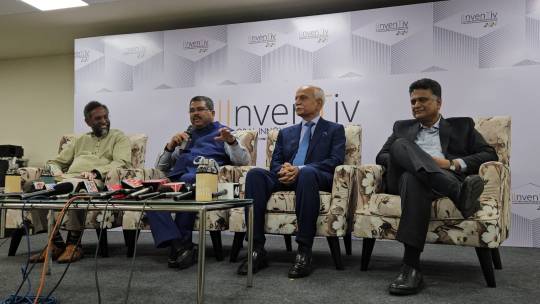
View On WordPress
#Dharmendra Pradhan#featured#Global Innovation Index#Global Technology Leadership#IIT Hyderabad Event#Indian Innovation#sciencenews#Startup Growth
0 notes
Text
GLOBAL INNOVATION INDEX (GII)
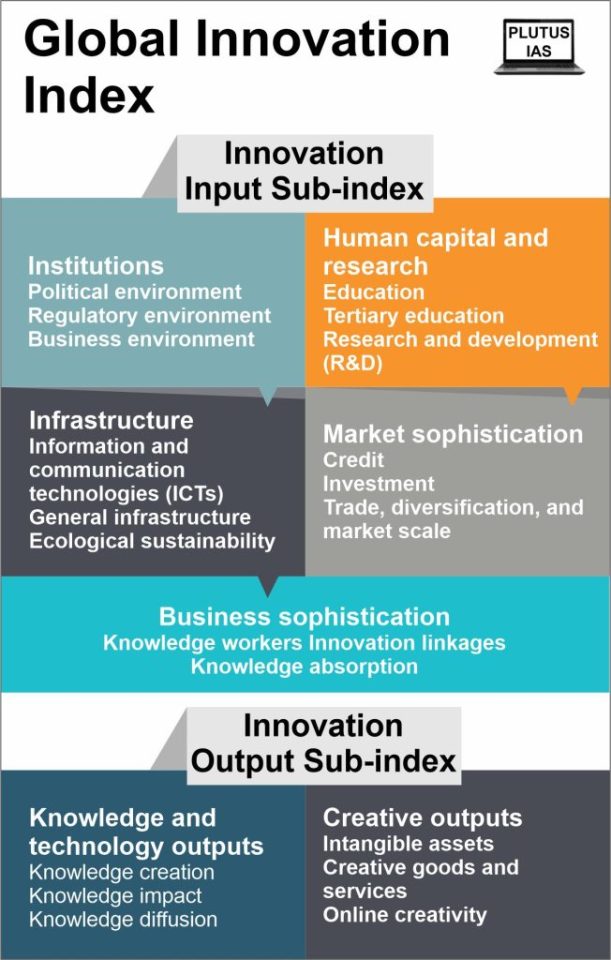
The article explains the insights of the Global Innovation Index, which aims to rank the different countries based on various aspects like technology, financial conditions, areas of improvement, and many more. Rishabh has written this article, and our well-reputed faculty Prateek Tripathi reviews it.
Strong Innovation Landscape: India’s innovation landscape is bolstered by notable achievements in various key indicators, including ICT services exports, venture capital investments, the number of graduates in science and engineering, and global corporate R&D investors.
Science and Technology Clusters: India has four S&T clusters among the world’s top 100, which include Chennai, Bengaluru, Mumbai, and Delhi. This number is comparatively lower than China’s 24 and the US’s 21 clusters.
Progress and Contributors: India’s progress in innovation is attributed to its abundant knowledge capital and a thriving startup ecosystem, supported by both public and private research organizations. The COVID-19 pandemic underscored the importance of innovation in addressing challenges, aligning with India’s vision of Atma Nirbhar Bharat (Self-reliant India).
Keep reading current affairs to make your exam preparation strong so that you can score high in the UPSC exam.
Plutus IAS has always been conquering the best UPSC coaching in Delhi and boosting the bright careers of many Civil Services aspirants.
#ias coaching in delhi#upscaspirants#upsccoaching#best ias coaching in delhi#ias#civil services examination#upsc exam preparation#education#iascoaching#plutus ias#Global Innovation Index#GII
1 note
·
View note
Text
WIPO Global Innovation Index Report 2022 – Part 6 – Asrar Qureshi’s Blog Post #738
WIPO Global Innovation Index Report 2022 – Part 6 – Asrar Qureshi’s Blog Post #738

View On WordPress
#Asrar Qureshi#Blogpost738#Development#Economy#Global Innovation Index#Human Development Index#Innovation#Innovative Countries#People Development#Pharma Veterans#Population#Poverty#Progress#Report2022
0 notes
Text
Global Innovation Index 2022
Traduction du résumé :
"L'indice mondial de l'innovation (GII) suit les tendances mondiales les plus récentes en matière d'innovation dans un contexte de pandémie de COVID-19, de ralentissement de la croissance de la productivité et d'autres défis en constante évolution. Il révèle les économies les plus innovantes du monde, en classant les performances en matière d'innovation de quelque 132 économies tout en mettant en évidence les forces et les faiblesses de l'innovation.
Destiné à dresser un tableau aussi complet que possible de l'innovation, l'indice comprend environ 80 indicateurs, dont des mesures de l'environnement politique, de l'éducation, des infrastructures et de la création de connaissances de chaque économie.
Les différentes mesures proposées par le GII permettent de suivre les performances et de comparer les évolutions par rapport aux économies de la même région ou du même groupe de revenus." - source
> Lire le rapport complet
0 notes
Photo
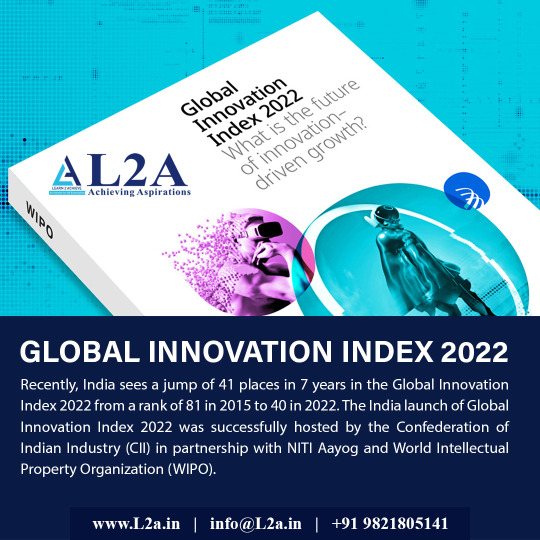
Current Affairs | 06-10-2022 | L2A
Key Findings of the Index:
1) Switzerland is the most Innovative economy in the world in 2022 - for the twelfth year straight - followed by the US, Sweden, the United kingdom and the Netherlands.
2) China is approaching the main 10 while Turkey and India enter the top 40 for the 1st time.
3) India is the development leader in the lower middle income group.
4) It keeps on driving the world in ICT services exports and holds top rankings in other indicators, including venture capital receipt value, finance for new businesses and scaleups, graduates in science and engineering, work efficiency development and domestic industry broadening.
5) The top worldwide corporate Research and development spenders increased their Research and development expenditure by almost 10% to over USD 900 billion out of 2021, higher than in 2019 before the pandemic.
#currentaffairs#currentaffairs2022#currentaffairsquiz#L2A#learn2achieve#IAS#UPSC#upscpreparation#upscmotivation#upsccoaching#explore#explorepage#global innovation index#global#innovation#wipo
0 notes
Text
Which countries are the 'wealthiest'?
Which countries are the ‘wealthiest’?
Last week I wrote a post about various indices of country-level environmental performance, which I prefaced with a caveat that the data are a few years old.
This week I’m going to discuss national indices of economic performance and prosperity. There are indeed some surprises.
But standard metrics of economic performance at the national level almost universally fail to encapsulate the…

View On WordPress
#debt#GDP#genuine progress indicator#Gini coefficient#Gini index#Global Innovation Index#GPI#gross domestic product#gross national income#income#Legatum Prosperity Index#poverty#prosperity#rich#total wealth#wealth
0 notes
Text

#Study in Ireland | Quick Facts#✅ Europe’s fastest growing economy#✅ Ranked#10 Globally for High-Quality Scientific Research#✅ Post Study Work Visa up to 2 Years#✅ All Universities Globally Ranked among top 5%#✅ Ireland is ranked 11th in the 2018 Global Innovation Index#Call us for more info: 8286867676#Visit https://numeneduservices.com/study-in-ireland/#studyinireland#ireland#overseaseducationconsultant#uk#studentvisa#gre#internationalstudents#studyenglish#students#toefl#ieltspreparation#studyinaustria#fall#educationconsultant#college#studyglobal#educationinireland#abroadstudies#abroad#studyabroad#internationaleducation
0 notes
Photo
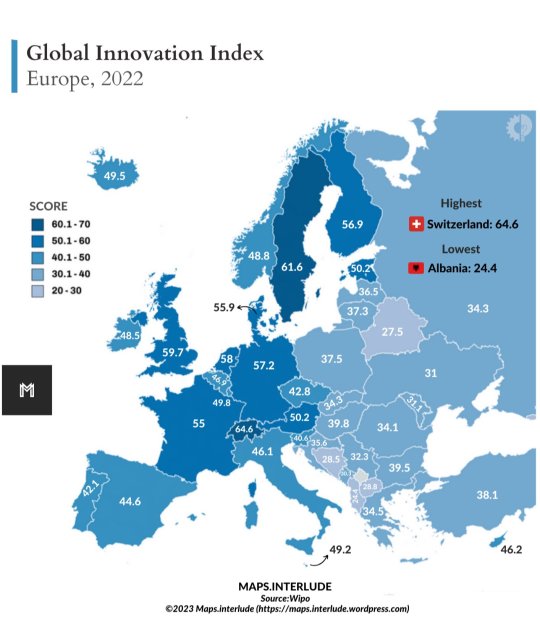
Global innovation index, Europe, 2022.
Highest: 🇨🇭Switzerland 64.6
Lowest: 🇦🇱 Albania 24.4
by Maps_interlude
58 notes
·
View notes
Text
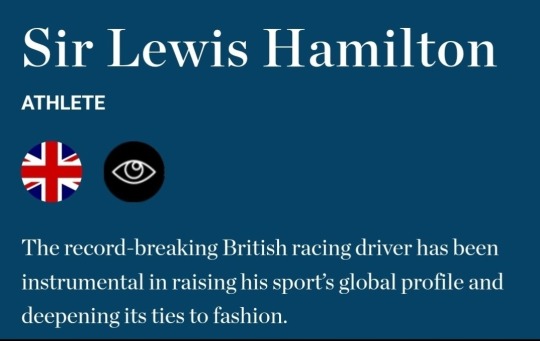


Sir Lewis Hamilton inducted into the Business of Fashion 500 Class of 2023, amongst the latest additions to the definitive index of the people shaping the global fashion industry of today and tomorrow. The selection criteria focuses on global community based on key factors including leadership, creativity, innovation and impact.
31 notes
·
View notes
Photo
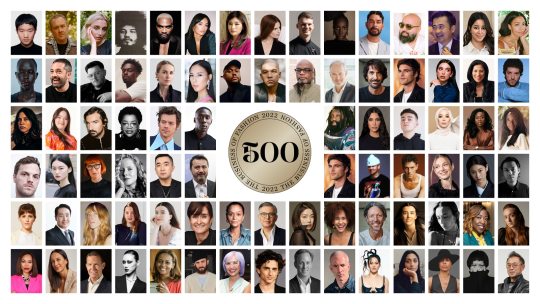


Harry is now a member of the 2022 Business of Fashion (BoF) 500 class. The editors have selected 103 new members to add to this influential global community based on their leadership, creativity, innovation and impact.
The BoF 500 Class of 2022 is our most diverse and global cohort to date, with members representing 43 different nationalities and based in 31 countries across 8 categories: Designers, Executives, Media, Retailers, Entrepreneurs, Creative Class, Models & Muses and more Catalysts than ever before pushing the industry forward to address our greatest challenges. They are based in London, New York, Paris and Milan, but also Kuala Lumpur, Johannesburg, Istanbul, Dakar and more. 51 percent are women, 47 percent are men, and 1 percent are non-binary (with the remaining 1 percent preferring not to say).
No other industry has a cast of characters as unique, passionate and diverse as those who animate the business of fashion, from business titans to creative upstarts, but what’s projected in the popular media is typically only a thin and often superficial slice of this captivating group. As always, we wanted to collect this talented community of people together, connect them with each other and share their stories of personal and professional growth in an honest and inspiring way.
As the name suggests, the BoF 500 first began as an index with the 500 most influential people in the global fashion industry in September 2013. Since then, we have regularly added new names to this inspiring, ever-growing group which now includes 1,193 people representing more than 70 nationalities, based in more than 45 countries.
You can learn more about the BOF 500 here.
201 notes
·
View notes
Text
WIPO Global Innovation Index Report 2022 – Part 5 – Asrar Qureshi’s Blog Post #737
WIPO Global Innovation Index Report 2022 – Part 5 – Asrar Qureshi’s Blog Post #737

View On WordPress
#Asrar Qureshi#Blogpost737#Development#Global Innovation Index#Incubation#Innovation#Innovative Countries#Inputs#Investment#Outputs#Pharma Veterans#Policies#Progress#Software#Technology
0 notes
Note
Are you an anticapitalist? you are good either way just curious
No, I'm not.
It's not a perfect system, but one need only look at indexes like the Global Freedom Index and the Human Development Index and observe which countries are at the top and which are not. One need only look at the correlation between economic growth and the decline of illiteracy, decline of child mortality, decline of reproductive burden on women, lower hunger, higher education, higher life satisfaction, and many other things.
An imperfect liberal system is still better than a perfect illiberal system.
“Beware the cult that sells you a utopia, because any dictatorial action can be justified by such a false vision.”
-- Rio Veradonir
Heaven is a utopian, perfect system. And what can you do there? Nothing. It's ruled over by a tyrant and nothing you do matters. It's perfect before you arrived, and it's no better (or worse) after you arrived. You can't change anything, you can't innovate, you can't make an impact. Something that is already "perfect" cannot be made more "perfect."
Just because something isn't perfect doesn't mean it can be improved. Free speech + the marketplace of ideas is not a perfect system that ensures truth and sanity always prevail, but attempts to "fix" it always make it worse.
No one screws things up more than utopians.
-- Colin Wright
Maintaining that "perfection" requires authoritarianism. We see this every single time. How else do you maintain a "perfect" system? How else do you protect that "perfect" system from imperfection? And what can't be justified in the name of maintaining that "perfection"? History has a bodycount of the horrors arising from attempts to enforce "perfect" systems. Yes, it has been tried. Many times.
So I'd much prefer an imperfect system that nobody controls than a perfect system enforced with an iron fist.
Philosophically, I'm not an anti-capitalist for the same reason I'm not anti-democratic or anti-science. I'll let Jonathan Rauch explain this.
Liberalism’s great contribution to civilization is the way it handles conflict. No other regime has enabled large and varied groups of people to set a social agenda without either stifling their members’ differences or letting conflict get out of hand. Bertrand Russell once said that “order without authority” might be taken as the motto both of political liberalism and of science. If you had to pick a three-word motto to define the liberal idea, “order without authority” would be pretty good. The liberal innovation was to set up society so as to mimic the greatest liberal system of them all, the evolution of life. Like evolutionary ecologies, liberal systems are centerless and self-regulating and allow no higher appeal than that of each to each in an open-ended, competitive public process (a game). Thus, a market game is an open-ended, decentralized process for allocating resources and legitimizing possession, a democracy game is an open-ended, decentralized process for legitimizing the use of force, and a science game is an open-ended, decentralized process for legitimizing belief. Much as creatures compete for food, so entrepreneurs compete for business, candidates for votes, and hypotheses for supporters. In biological evolution, no outcome is fixed or final—nor is it in capitalism, democracy, science. There is always another trade, another election, another hypothesis. In biological evolution, no species, however clever or complex, is spared the rigors of competition—nor are the participants in capitalism, democracy, science. No matter who you are, you must conduct your business in the currency of dollars, votes, or criticism—no special fiat, no personal authority.
[..]
Order emerging as each interreacts with each under rules which are the same for all (order without authority): just as that idea links the great liberal systems, so it also links the great liberal theorists. Darwin is known to have been strongly influenced by the economic ideas of Adam Smith. “The theory of natural selection,” writes Stephen Jay Gould, a paleontologist and historian of science, “is a creative transfer to biology of Adam Smith’s basic argument for a rational economy: the balance and order of nature does not arise from a higher, external (divine) control, or from the existence of laws operating directly upon the whole, but from struggle among individuals for their own benefits.
[..]
The disadvantages are serious, and must not be passed over lightly. First, the notion of empowering a vast, amorphous, unsupervised mass of voters and traders to make crucial social decisions defies all common sense and intuition. Instinct sides with Plato: it makes more sense to have the wisest man decide who gets what or who should rule. That is why learning democratic values and market values, which make the judgments of democratic and market systems “feel” right, takes centuries of cultural development and years of personal education; it is why people who are used to an authoritarian moral climate have such a hard time switching to the mechanisms of democracy and markets, and so often make a botch of it.
Second, open-ended, decentralized decision-making systems are perpetually unsettling. They cannot be counted on to reach any particular result, and often, since they put no one in particular in charge, they reach results which don’t particularly please anyone. The only constant is change, and change is unnerving and sometimes painful and wasteful. Leaders go in and out of power, sometimes too quickly to hold any course; markets shut factories and move jobs. No one can count on staying on top.
But the advantages of the two systems are enormous. They are flexible, which means that they adapt readily to change. They are broadly inclusive, and so make the most of human diversity. (Anyone can vote, anyone can own.) Yet by and large they are stable, despite being both flexible and broadly inclusive. And so they are liberal in this important sense: they allow us to be relatively free to be ourselves, each to make the contribution that suits him, with comparatively little risk of upending the whole system.
-- Jonathan Rauch, "Kindly Inquisitors"
In principle, if I've got a great idea, I could topple McDonald's or Microsoft or Amazon. You may scoff, but where are MySpace, Kodak, Blockbuster, Blackberry and whoever ended up with Palm? These were once some of the biggest organizations in the world. Look at the impact of Tesla. Any company is only as good as the last product or service they released, and past performance is no guarantee of success in the future. If you don't stay relevant, your business dies. Just as any political leader is only as good as their latest ballot, and any scientist is only as good as their latest ideas.
Evolution is behind the market game. At any point, you could be obsolete and at the wrong end of "survival of the fittest." After the rise and fall of all the purported "iPod killers," look who actually killed the iPod: Apple. It doesn't really exist any more, it's just the Music app on your phone.
People looking for a perfect system are looking for certainty. They want to know what the future will be, and more importantly, be able to control it to suit their preferences. They want to circumvent the rules of the game which apply to everyone (equality) and have the authority to decide - and enforce - what the result should really look like (equity). And they will decide what people really deserve.
But evolution has no certainty, as it's undirected. Changes to the environment are unpredictable. As soon as you try to direct evolution, you have an authority figure creating something that suits their own particular purposes, and the natural, erratic process of evolution has stopped. You now have creationism and the authoritarianism that goes along with it.
The beauty in these liberal systems is the same beauty in evolution itself: uncertainty. We need to get more comfortable with that.
One particular area where I'd argue the system is imperfect is where the evolutionary process has been short-circuited. Companies with questionable ethics put #BLM or a rainbow flag on their Twitter account for free, trot out a statement riddled with fashionable social shibboleths, and people look away from their business practices, tacitly deciding that they're comfortable with them by buying the next product, the next service, the next update.
Kind of like Passover, but with hashtags instead of lamb's blood. If you make the right offering, the Hand of God will pass by you and not look beyond the blood on the door.
We've already seen what can happen with consumer backlash. Netflix, Disney, Bud Light, Target. You don't have to agree with the basis for the reaction, but all bore the brunt of consumer dissatisfaction and paid the price. Some adjusted course, some doubled-down, some have committed to gaslighting the consumer, putting ideology above their core business.
The point, though, is this: what do you put up with as a consumer to have what you want? If you're discontent with a business' practices, then what have you done to force the pressure on them to adapt, to evolve? And why not?
Evolution requires pressures for survival.
To those who have a "smash capitalism" sticker, where did you put it? The bumper of your hybrid SUV? The case of your iPhone 14 Pro Max? The back lid of your ASUS Zenbook Flip?

Now imagine a world where this actually came to pass. Capitalism has been smashed. The means of production has become public, part of the government. The telecommunications companies, the tech companies, the automotive companies, the manufacturing companies are all no longer privately owned and in competition, but by the government. The same government which runs departments that function like the DMV, creates a Ministry of Truth, and which can't get a healthcare website to stay up.
The government doesn't need to compete against itself, so it doesn't need 5 mobile services. One will do just fine. There's no competition for customers who want faster speed, so 6G, which would have hit in 2030 is no longer a priority. Where is anyone going to go? 5G will be good enough for the next 30 years. The government's not a corporation, so it doesn't need to - and shouldn't - make a profit from its services.
It doesn't need to make a better, more feature packed phone next year, because it's not competing with anyone. It can just keep producing the same one for the next 10 years. And there's only one because who needs all those brands when they're all now under the government umbrella? Phase out Google Pixel, phase out the iPhone Pro/Max/Plus models that are status symbols of the aristocracy and bourgeoisie classes, and cut it back to one iPhone SE. Since the telecommunications and tech companies are now government entities, there's no longer any pushback to putting monitoring software on every phone the government makes in the operating system the government installs, on the network the government controls.
There's no longer a need for 10 different compact SUVs competing with each other, so it cuts this back to one. And some government bureaucrat who doesn't really understand cars doesn't see why you need an SUV anyway, since it's just a jacked-up hatchback, so a pen-stroke from somebody in a government office sees those go away in the name of efficiency. The factories can all produce the same design, not a multitude of different ones, because that's a bureaucratic headache.
The streaming companies are all no longer competing against each other, since they are all subsidiaries of the government now. So, why do we need so many shows in production? And why do they need to earn money anyway, other than to fund more productions and line the pockets of shareholders? And what sort of content do you think they're going to play now that the government has a monopoly?
I could keep going.
Now, where are the evolutionary pressures? Every sector now functions at the speed, efficiency and innovation level of the government (i.e. very, very low).
If you doubt any of this, look around at the automotive and technology industries of non-free market countries. And I don't mean "western company X has a factory in Y." I mean, what is Y's own industry like? What is it producing?
The idea that anyone would want the government in charge of innovation and industry, rather than merely enforcing the liberal rules of the market game, is disturbing. Seriously, has anyone who is an anti-capitalist ever actually looked around at their life and realized what it would be like for there to be no market competition, and for the idiots in government to be in control of the means of production?
The core driver of the free market, as with biological evolution, is competition. Competition for survival and relevancy. It drives innovation, efficiency and downward pressure on prices. Take that away and what do you have? Which countries best exemplify a system with no competition? What are you willing to give up to eliminate free market competition and become more like them? Or, perhaps, why haven't you already moved there? What's keeping you living in this oppressive regime? Not enough frequent flyer miles?
When the Berlin Wall fell, in which direction did people migrate? When people risk their lives on ramshackle rafts to escape from one country to another, in which direction are they fleeing?
If you ever wonder which system is better, ask someone who immigrated from their country of birth to your country of birth why they went to the trouble. Buy your Uber driver, your Amazon carrier, or your dorm's cleaning staff a coffee and an hour of their time to tell you their story. The idea that a free market, where you can work your way up in the world, improve your situation for yourself and your family, needs to be taken away and torn down, is something that only the privileged and well-to-do have the luxury of proclaiming.
"Luxury beliefs are ideas and opinions that confer status on the upper class, while often inflicting costs on the lower classes."
-- Rob Henderson
And once again, I know it's not perfect. I said so up front. I think many of these corporations need to be better ecologically and in terms of their manufacturing personnel practices. But how you do that is by creating market pressure.
But as far as I can tell, at least some of the blame for this can be laid at the feet of consumers who have become complacent, respond to the distractions of empty virtue signalling, and are too comfortable to make sacrifices for their high and mighty principles. People lose their nerve when it comes to criticizing China ("what are you, a racist?"), and get distracted when the culprit makes cheap, easy LGBTQWERTYALPHABETWTF signals, because now they're an "ally," and personal interest supersedes the greater moral mission.
If you want the market to go in a certain direction, then you have to generate the evolutionary pressure that forces it to do so. You have to play the game - just as you have to play the science game, the politics game - not throw a hissy fit that you should be exempt from the rules or get to steal the ball so nobody else can play. If that sounds too hard, then it's probably not as big a priority as you'd like to believe is it. But how hard do you think it would be to live in an economy completely devoid of any evolutionary pressure whatsoever?
It's much easier to whine about "the system" while standing in line with your Apple Watch out to pay for your next Venti decaf soy pumpkin-spice latte with extra whip. But just know that everybody around you is rolling their eyes.
#ask#liberal ethics#liberalism#liberal market#free market#utopianism#anticapitalism#anti capitalism#religion is a mental illness
12 notes
·
View notes
Text
Game 1: Pioneering Sustainable Development: Empowering Students Through Sustainable Development Goal
youtube
Source: https://youtu.be/5G0ndS3uRdo?si=SgcYDkNKS_lQhGfC
Hey there! Welcome to my blog, where I'll be sharing my adventures as a mechanical engineering student at the University of Science and Technology of Southern Philippines. Today, I want to take you on a journey into the fascinating world of innovation and problem-solving as we tackle some of the most pressing global challenges in our field.
Picture this: our class has been given an exciting assignment to brainstorm innovative solutions for various global problems that align with our course, focusing on "Industry, Innovation, and Infrastructure." It's a daunting task, but as budding engineers, we're up for the challenge!
So, what exactly are these global problems, you ask? Well, they range from optimizing energy infrastructure and revolutionizing transportation systems to tackling waste management issues and promoting sustainable manufacturing practices. The possibilities are endless, and the potential impact of our solutions is immense.
As we gather in the brainstorming session, the room buzzes with excitement and anticipation. Armed with our knowledge of mechanics, design principles, and cutting-edge technologies, we dive headfirst into the discussion. Ideas start flowing freely as we explore different approaches and perspectives.
One of the key themes that emerge from our brainstorming session is the importance of interdisciplinary collaboration. We quickly realize that solving complex global problems requires input from experts in various fields, including environmental science, economics, and social sciences. By working together, we can leverage our collective expertise to develop holistic and sustainable solutions that address the root causes of these challenges.
But brainstorming is just the beginning. As we sift through our ideas, we also recognize the need for continuous improvement in our innovative tasks. We understand that the path to success is paved with experimentation, iteration, and learning from failure. So, we roll up our sleeves and get ready to prototype, test, and refine our designs until we achieve optimal results.
Throughout this process, we're fueled by a sense of purpose and passion for making a difference in the world. As mechanical engineering students, we have the power to drive positive change and shape the future of industry, innovation, and infrastructure. And with each brainstorming session, we get one step closer to realizing that potential.
So, there you have it – a glimpse into our brainstorming session as mechanical engineering students on a mission to tackle global challenges. It's a thrilling journey filled with creativity, collaboration, and a relentless pursuit of improvement. And I can't wait to see where it takes us next!
We did also an personality test and Innovative Index. As an INFJ-T advocate, I embody a rare and compelling combination of traits that set you apart as a compassionate and visionary leader. My personality type, characterized by Introversion, Intuition, Feeling, and Judging tendencies, reflects your deep empathy for others and my unwavering commitment to social justice causes. With a keen intuition and a profound understanding of human emotions, I possess a remarkable ability to advocate for the marginalized and empower those in need. My advocacy efforts are fueled by a strong sense of purpose and a desire to create meaningful change in the world. As an INFJ-T, I embrace my role as a catalyst for positive transformation, using your unique gifts to inspire others and champion causes that align with my values.
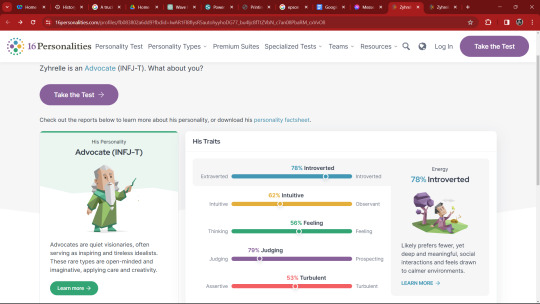

Thanks for joining me on this adventure. Until next time, keep innovating and dreaming big!
2 notes
·
View notes
Text
China's economy remains a driver of global growth
China's manufacturing purchasing managers' index rose to 49 in June from 48.8 in May, the latest data from the National Bureau of Statistics showed, ending three straight months of decline and another encouraging sign of economic recovery. According to this year's government Work Report, China aims for economic growth of around 5 percent by 2023. China's GDP grew 4.5 percent year on year to 28.5 trillion yuan ($3.97 trillion) in the first quarter of 2023, official data showed. Faced with domestic and international challenges such as weak domestic demand and geopolitical risks, the government has stepped up efforts to boost economic growth. The central bank has cut the one-year interest rate on the medium-term lending facility, a tool to add liquidity to the banking system, by 10 basis points to 2.65 percent. About 237 billion yuan ($33.15 billion) was injected into the market through the operation. We will reduce financing costs for enterprises and increase loans to small and micro businesses. Industries dedicated to technological innovation or key industrial chains will enjoy tailor-made tax and fee cuts, and small taxpayers with monthly sales of less than 100,000 yuan ($13,880) will be exempt from VAT by the end of this year.
#business credit reports
business credit reports supplier
2 notes
·
View notes
Text
Hiranandani Industrial Parks Paving the Way for a Greener Future With IGBC Certification
Hiranandani Industrial Parks, a renowned provider of Grade A+ infrastructure and progressive business spaces recently achieved a remarkable milestone. They proudly announced that their company has obtained the prestigious IGBC (Indian Green Building Council) Certification for Sustainable Infrastructure. This certification solidifies Hiranandani Industrial Parks' commitment to sustainable development and positions them as a leader in creating environmentally responsible framework.
Promoting Sustainable Practices
The IGBC Certification is awarded to buildings and infrastructure projects that meet rigorous criteria for sustainable design, construction, and operation. Hiranandani Industrial Parks' dedication to sustainable practices is evident in their projects, which adhere to global standards and green building certification requirements. By integrating eco-friendly measures into their developments, they are setting new benchmarks for sustainable infrastructure in the industry.
Embracing Green Initiatives
Hiranandani Industrial Parks has implemented a range of initiatives to foster a greener future. These initiatives include the promotion of natural habitat and biodiversity through the incorporation of green spaces and the planting of numerous trees within their infrastructure. By prioritising water conservation, the company has installed rainwater harvesting and wastewater treatment systems, as well as incorporated low-flow fixtures to reduce water usage.
Reducing Carbon Footprint
Hiranandani Industrial Parks has strategically planned their infrastructure to reduce vehicular traffic. Their projects are well connected to bus stops, major highways, and even the Chennai Airport, enabling efficient movement of goods and reducing carbon emissions associated with transportation.
Innovation and Energy Efficiency
Hiranandani Industrial Parks embrace innovation to achieve energy efficiency within their infrastructure. They employ Solar Reflective Index (SRI) sheets that reflect sunlight and reduce the need for cooling, resulting in significant electricity savings. Additionally, the strategic placement of transparent sheets on roofs maximises the utilisation of natural light, minimising reliance on artificial lighting. The parks also incorporate ventilation systems that improve air quality and reduce energy consumption. By using LED lighting fixtures and energy-efficient pumps, Hiranandani Industrial Parks ensure that their developments conserve energy and contribute to a sustainable future.
Waste Management and Ecological Soundness
Responsible waste management is a crucial aspect of sustainable development. Hiranandani Industrial Parks promotes waste segregation through the provision of colour-coded dustbins, encouraging proper waste disposal and recycling. They also prioritise the use of environmentally friendly products and materials that meet green standards, ensuring that their projects are ecologically sound and contribute to a healthier environment.
Benefits for Businesses and Communities
The IGBC Certification for Sustainable Infrastructure not only reinforces Hiranandani Industrial Parks' dedication to sustainability but also provides substantial benefits to businesses and communities. Companies within IGBC-certified infrastructure gain a competitive edge by aligning themselves with sustainable practices, which are increasingly preferred by customers and investors. Furthermore, the energy and water-saving measures implemented within the infrastructure result in reduced operating costs for tenants, fostering a more economically viable environment.
Conclusion
The IGBC Certification is a remarkable accomplishment for the industry. It unequivocally proves Hiranandani Industrial Parks' unwavering dedication to sustainable development, energy efficiency, waste management, and ecological soundness and their leadership and vision in creating a greener future. By embracing sustainable practices, they not only enhance the value proposition of their spaces but also inspire other industry players to follow suit. Hiranandani Industrial Parks is paving the way for a sustainable and prosperous future where businesses thrive harmoniously with the environment.
#warehousing facility in chennai#hiranandani industrial parks#industrial parks in chennai#IGBC Certification
2 notes
·
View notes
Photo
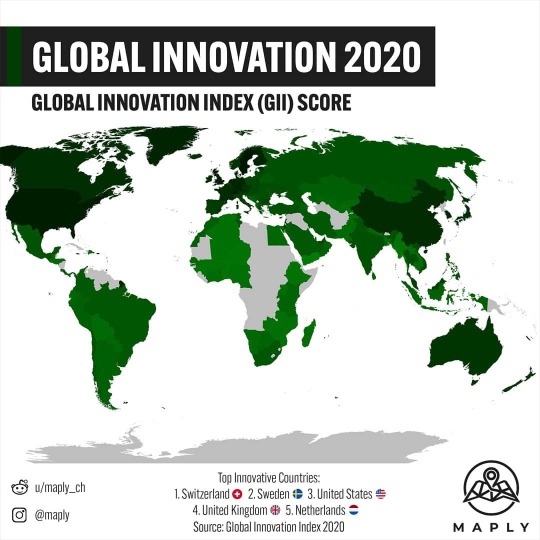
Global Innovation Index, 2020.
by maply
The Global Innovation Index (GII) sheds light on the state of innovation by pointing to progress and remaining challenges, including in the context of the COVID-19 crisis.
59 notes
·
View notes